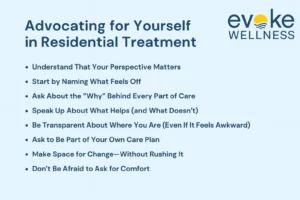You don’t have to be falling apart to want something different.
Sometimes you’re just tired. Or disconnected. Or quietly wondering, “What if I tried living without the thing I’ve leaned on for so long?”
Being sober curious doesn’t always come with a rock bottom. It often comes with gentle doubts. A sense that something isn’t quite working. A hunch that there might be more.
If you’re considering residential treatment but worried about losing your voice in the process, this blog is for you. At Evoke Wellness in San Marcos, Texas, we believe care should feel like a partnership—not a prescription.
Here’s how to advocate for yourself, even when you’re still figuring things out.
1. Understand That Your Perspective Matters
You’re not “less qualified” to have opinions about your care just because you haven’t hit a crisis. In fact, one of the most empowering things you can do is explore support before your life falls apart.
And in that exploration, your insights—your preferences, questions, doubts—are vital. You know how you learn. What puts you at ease. What makes you shut down. That matters.
Treatment isn’t about compliance. It’s about collaboration. Whether you’re curious, cautious, or somewhere in between, your voice is part of the process from day one.
2. Start by Naming What Feels Off
You don’t have to have the language of addiction or mental health to start this conversation.
Sometimes advocacy starts with simply saying:
- “Something’s not working, but I don’t know what.”
- “I feel disconnected from myself lately.”
- “Drinking isn’t a crisis, but it’s not helping anymore.”
- “I want to try something new, even if I’m not sure what yet.”
One client told us:
“I walked in not knowing what I needed—I just knew I was tired of doing it alone.”
That was more than enough to begin.
3. Ask About the “Why” Behind Every Part of Care
When you’re new to treatment, it’s easy to assume you have to follow a script. But the most engaged clients are often the ones who ask:
- Why do we use this method?
- How does this type of therapy work?
- What are my options if I’m not ready for that group?
- Can we focus more on anxiety than substance use right now?
Curiosity isn’t disrespectful. It’s a sign that you’re engaged—and that you want your care to reflect who you are, not just what the program covers.
At Evoke Wellness TX, we encourage those questions. They help us shape something that fits you—not the other way around.
4. Speak Up About What Helps (and What Doesn’t)
Advocating for yourself doesn’t have to mean pushing back. It can also look like leaning into what’s working and letting us know.
Here’s what that might sound like:
- “I feel grounded after morning meditation—can I do more of that?”
- “I don’t connect well in big groups. Smaller sessions help me open up.”
- “Writing works better for me than talking sometimes. Can I bring that into therapy?”
One person shared:
“I thought if I liked something, it meant I wasn’t working hard enough. But I realized—comfort can be part of healing.”
Knowing what supports you allows us to reinforce it. And knowing what doesn’t? That’s just as important. You’re not being difficult. You’re being honest.
5. Be Transparent About Where You Are (Even If It Feels Awkward)
You don’t have to perform your readiness. In fact, trying to act “ready” when you’re still unsure can delay the real work.
Some of the most powerful breakthroughs happen when clients say:
- “I’m here, but I’m not sure I belong.”
- “I’m curious about sobriety, but I don’t know if I want it forever.”
- “I’m scared I’ll lose myself if I stop drinking.”
These aren’t red flags. They’re openings.
Our job isn’t to convince you of anything. It’s to walk with you while you figure it out—for yourself.
6. Ask to Be Part of Your Own Care Plan
Every client in residential treatment gets a care plan. But too often, it’s written about the client, not with them.
That’s not how we do things.
At Evoke Wellness TX, you’ll participate in shaping your treatment plan from the beginning. We’ll ask what brought you in, what you’re open to, what you’re not. We’ll explore goals together—short-term, long-term, and “let’s just see.”
You can say:
- “I want to focus on anxiety first.”
- “Let’s keep substance use on the table, but I don’t want it to be the only thing.”
- “Can we build in space for creativity, or nature, or movement?”
You’re not a case file. You’re a person. And your plan should reflect that.
7. Make Space for Change—Without Rushing It
One of the most powerful forms of advocacy is giving yourself permission to evolve. You don’t have to stay in one identity, one set of preferences, one idea of what this experience “should” be.
You might start treatment unsure if you belong—and end up finding parts of yourself you didn’t know you’d lost.
You might resist group therapy for the first week—and then realize someone else’s story helped unlock your own.
Change doesn’t have to be fast to be real. And just because you’re not ready today doesn’t mean you won’t be tomorrow.
8. Don’t Be Afraid to Ask for Comfort
Yes, healing is hard. But it doesn’t have to be cold.
Many sober curious clients worry that asking for ease, rest, or emotional safety will make them seem unserious. In truth, it’s the opposite.
Asking for comfort shows you’re paying attention to what your system needs to stay open, present, and grounded.
That might look like:
- Requesting a different therapist if the match doesn’t feel right
- Asking for quiet space when things feel overwhelming
- Taking time to settle into a group before speaking
- Building in creative or restorative activities that don’t center on substance use
You deserve care that’s kind, not just corrective.
FAQs: Advocating for Yourself in Residential Treatment
What if I don’t fully identify as “addicted”?
That’s okay. Residential treatment isn’t just for people with a specific diagnosis or label. We work with people in all stages of reflection—including those still figuring it out.
Will I be taken seriously if I haven’t hit “rock bottom”?
Absolutely. Your pain, confusion, or curiosity are enough. You don’t need a dramatic backstory to deserve support.
Can I be involved in choosing my therapist or treatment style?
Yes. We prioritize fit—emotionally, culturally, and clinically. If something doesn’t work for you, you can ask for a change at any time.
Do I have to commit to lifelong sobriety to attend treatment?
No. We meet you where you are. Some people enter treatment to explore sobriety—not to declare it forever. That space is valid here.
What if I try something in treatment and don’t like it?
That’s part of the process. We’ll help you process your reactions and make adjustments. Your feedback helps us support you better.
You Don’t Have to Lose Yourself to Heal
If you’re thinking about treatment but afraid of losing your voice, identity, or freedom—know this:
You don’t have to become someone else to feel better.
You just have to be willing to be seen. Even in the messy middle. Even when the answers aren’t clear yet.
At Evoke Wellness in San Marcos, Texas, we don’t ask you to surrender your voice to get help. We ask you to bring it with you. Let us help you amplify it.
Call (888) 450-2285 or visit Residential Treatment services page to learn how we can support your care journey—on your terms.



